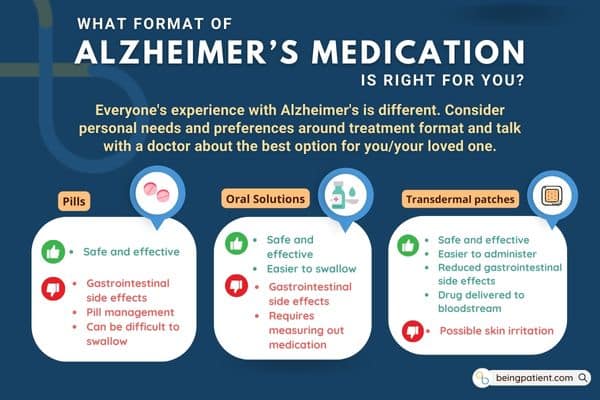
Although the effectiveness of Alzheimer’s medications varies from person to person, they are generally well tolerated by patients. Before starting a new medication, talk with your physician about the potential side effects and dosage. Donepezil (Aricept) is approved to treat all stages of Alzheimer’s disease. Rivastigmine (Exelon) and galantamine are approved to treat mild-to-moderate dementia.
Cholinesterase inhibitors, such as Aricept, are approved for the treatment of all stages of the disease. They also slow the degradation of acetylcholine, a neurotransmitter that is produced by brain cells. Acetylcholinesterase inhibitors slow the breakdown of acetylcholine and help the brain retain higher levels of the neurotransmitter. Galantamine, a neurotransmitter found in the brain, is believed to promote the release of acetylcholine and nerve cell response to it.
Cholinesterase inhibitors are used for the treatment of mild-to-moderate forms of the disease. While these drugs do not completely reverse the disease’s progression, they can ease the burden on caregivers and reduce symptoms. Some people with the disease may need to take these drugs for a long time. They may not be effective for all patients, but they are beneficial to some. For people with moderate or advanced stages of the disease, cholinesterase inhibitors are recommended for those who do not show symptoms immediately.
While the right medication for your loved one is unique to their particular condition, the best treatment plan for you depends on his or her condition and symptoms. These medicines help with the cognitive symptoms of the illness and also help caregivers take care of their loved ones. Some of these medications may even improve your loved one’s condition and make the process easier for them and their family members. That’s why it’s so important to talk to your doctor about any possible side effects of the medications you’re taking.
There are many different types of drugs for Alzheimer’s disease. Some of the more common ones are called cholinesterase inhibitors. They inhibit enzymes that break down acetylcholine, which is important for memory and learning. A high level of acetylcholine is necessary to maintain normal nerve cell function. When combined with other medicines, these drugs can slow the progression of the disease. However, they do not completely prevent it.
Cholinesterase inhibitors are drugs that prevent the breakdown of acetylcholine, a chemical messenger involved in learning and memory. High levels of acetylcholine maintain communication between nerve cells. In contrast, cholinesterase inhibitors are not suitable for people with certain heart conditions. It is important to discuss side effects with your doctor before starting a new medication. It is essential to discuss the pros and cons of each of these drugs.

The most common types of Alzheimer’s drugs are cholinesterase inhibitors, which improve communication between cells. In addition, cholinesterase inhibitors may also help patients with other types of dementia, such as schizophrenia and bipolar disorder. The use of these drugs will depend on your condition and the symptoms you have. In addition, some of them can cause side effects such as cardiac arrhythmia, which is a serious risk.
Cholinesterase inhibitors have several side effects, including fainting, seizures, and depression. These drugs should only be used in patients with mild or moderate symptoms. They can have serious side effects and may increase the risk of heart blockage. They should not be used in severe dementia or symptoms of mild illness. These drugs can lead to a worsening of the patient’s mental state. So be sure to get more information at Prende
before taking any Alzheimer’s medication.
Various medications for Alzheimer’s disease are available. The most common are cholinesterase inhibitors, which prevent the breakdown of acetylcholine. This chemical is essential for memory and learning, and high levels of acetylcholine in the brain are important for communication between nerve cells. A number of other types of medications can slow the progression of Alzheimer’s disease. But it is important to remember that all these drugs can be dangerous.
The FDA has approved two types of Alzheimer’s drugs. These drugs are prescribed to treat symptoms and slow the progression of the disease. These drugs are FDA approved for the treatment of mild to moderate Alzheimer’s disease. These drugs only work temporarily, and there are many other types of drugs. While these medications may help patients for a limited period of time, they should always be discussed with a doctor. If you are not sure which type of medication is right for you, check with your doctor.